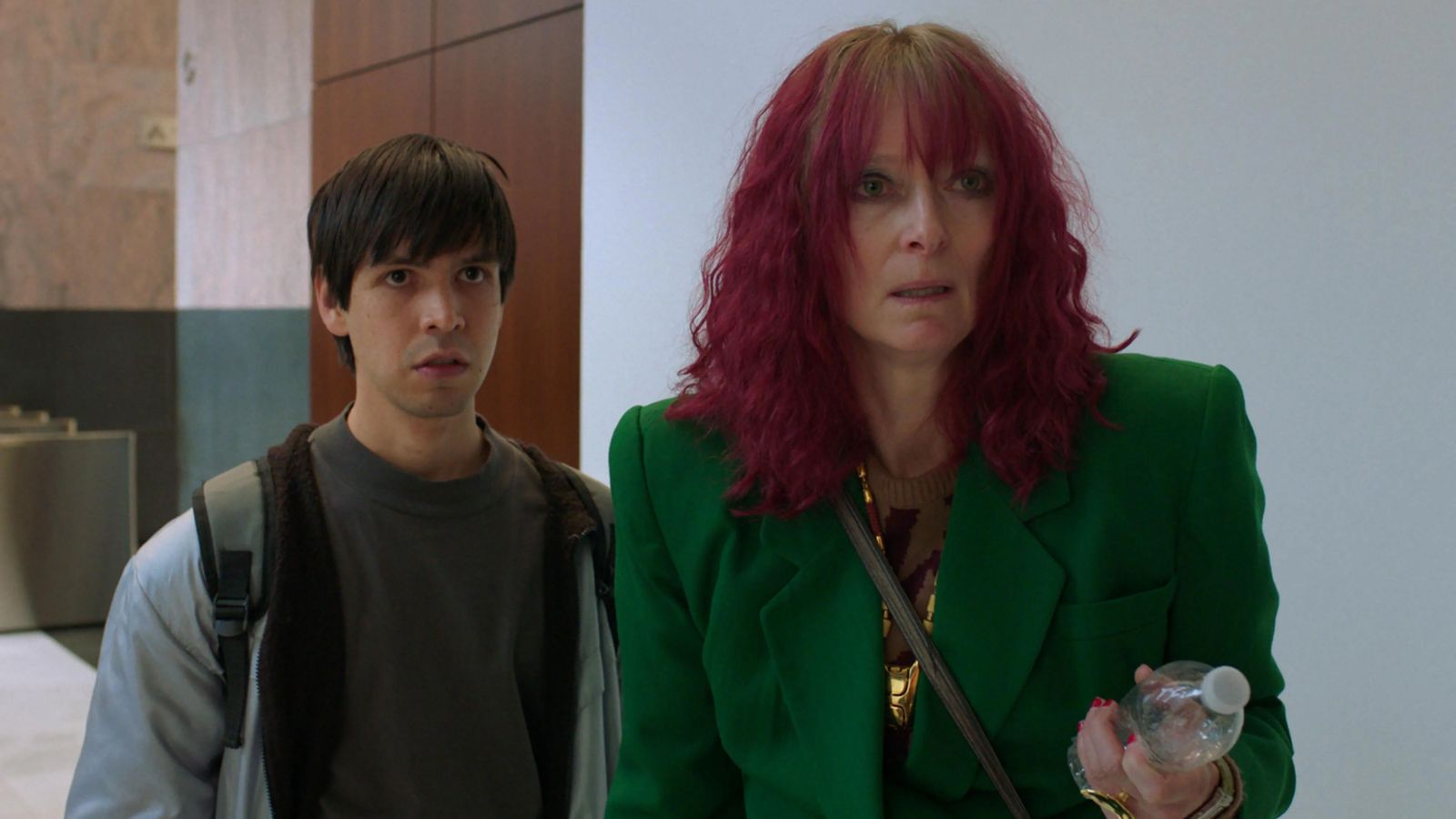The term “unique voice” gets thrown around a lot. But how else do you describe Julio Torres? Over several years as a writer for Saturday Night Live and actor on HBO’s Los Espookys he’s quietly cultivated his own fresh, distinguished comedic sensibility, highlighting the surreality and humanity in the perfunctory. That’s most evident in the variety of digital shorts written during his time at 30 Rock, where he captured, for example, the nightmares and paranoia of a graphic designer tortured by Avatar’s papyrus font, or the inner life of an oddly shaped glass sink in an otherwise bland linoleum bathroom. You picture him looking at the world with his head slightly bent.
In Problemista, Torres’ feature-length writing and directing debut––loosely based on his own struggles as an immigrant––everything is just slightly off-kilter, too. Consider the single clump of hair that sticks out from his character’s head, or the way he walks, almost bouncing with each step as if gravity’s pull had lessened by a fraction. They’re details that help fill out a magic-realist vision of a Salvadorian’s attempt to keep his green card status and pursue his niche passion in New York City. They also provide a humorous glow to a story about preservation, creativity, and the courage to fight off corporate entities attempting to dismantle those individual concerns.
In this fable partially narrated by Isabella Rossellini, Torres plays Alejandro, an aspiring toy designer who works at a cryogenic laboratory where the city’s elites can preserve their bodies for hundreds of years. While monitoring the cryo-chamber of an artist named Bobby (RZA), he fills his little black diary with new toy ideas––a cabbage-patch doll whose phone displays a dating-app conversation, or a slinky that doesn’t roll down the stairs and teaches children to do the hard work themselves. When fired for accidentally unplugging Bobby’s freezer, Alejandro is forced to find new employment, lest he be deported to his home country to live with his worried mother (Catalina Saavedra).
That opportunity comes quickly when Elizabeth (Tilda Swinton), Bobby’s wife and a notorious, recently outcast art critic, needs Alejandro’s help cementing her husband’s legacy by collecting and then selling his 13 portraits of eggs to a gallery, ensuring enough funds to keep his body frozen. In desperate need of a sponsor, he takes a job as her assistant, presuming his tasks and responsibilities won’t be too challenging. But Elizabeth is a mess––quite literally. Her Manhattan loft is filled with clutter and wires (Torres can’t resist spotlighting the disheveled interiors), and she insists Alejandro use a specific (and unlearnable) archival web application to organize Bobby’s paintings.
Torres knows he has a good sparring partner in Swinton, whose manic red hair exudes the frazzled, angry reputation Elizabeth has cultivated. Their dialogue and arguments supply the frenetic energy and comedy, and it’s thrilling to watch Torres turn them into absurdist reenactments. Whenever Elizabeth makes an impractical demand the mild-mannered Alejandro can’t immediately fulfill, Torres transports their conversation to a cave and turns Elizabeth into Hydra, a visual representation of her venomous barking. As the vitriol cools, her heads shrink and the cave dissolves back into her discernible apartment.
In some ways, Torres wants you to feel the heightened experience of his characters, finding surrealist ways to document anxious and burdensome situations that might otherwise get overlooked. To keep paying his rent Alejandro scours the web for odd jobs, encountering a psychedelic Craigslist monster (Larry Owens) shouting out random and irrelevant listings. When a woman at the immigration office is told she must evacuate the country tomorrow, her body disappears into thin air. It’s a small, comical flourish, but a vital pivot. This isn’t a standard tale of border crossings and families being separated. Torres is instead focused on the depressing, mundane humor of sadistic bureaucratic structures, how someone’s visa status must rely on a woman unafraid to unleash her inner Karen at a cafe waiter.
But Elizabeth isn’t a real Karen, as Swinton clarified this week at a post-screening Q&A. Though cruel and unnecessarily loud and occasionally ignorant, she remains an advocate for herself against the hegemonic structures attempting to thwart her work and livelihood. It’s a useful lesson for Alejandro, who struggles to stand up for himself against Hasbro, the toy company he feels destined to work for. There’s a great joke––and even better kicker in the credits––about overdraft fees at Bank of America’s expense, which bottles Elizabeth’s nudging to “become a problem” for faceless corporations.
In this mad dash around the city––and as the clock runs down on his visa––Torres suggests the importance of carrying (and sometimes unleashing) small doses of aggression when necessary. Alejandro is a meek, dutiful worker, too willing to let others trample his goals, but Elizabeth nourishes his bulldog when he needs it to bark. The beauty is that Torres never forces these messages down your throat. The movie is too looney, too specific to be so obvious. It’s the kind of debut that sneaks up on you at a festival––a personal little achievement that feels major. You can’t help but tilt your head with him.
Problemista premiered at SXSW 2023 and will be released by A24.

